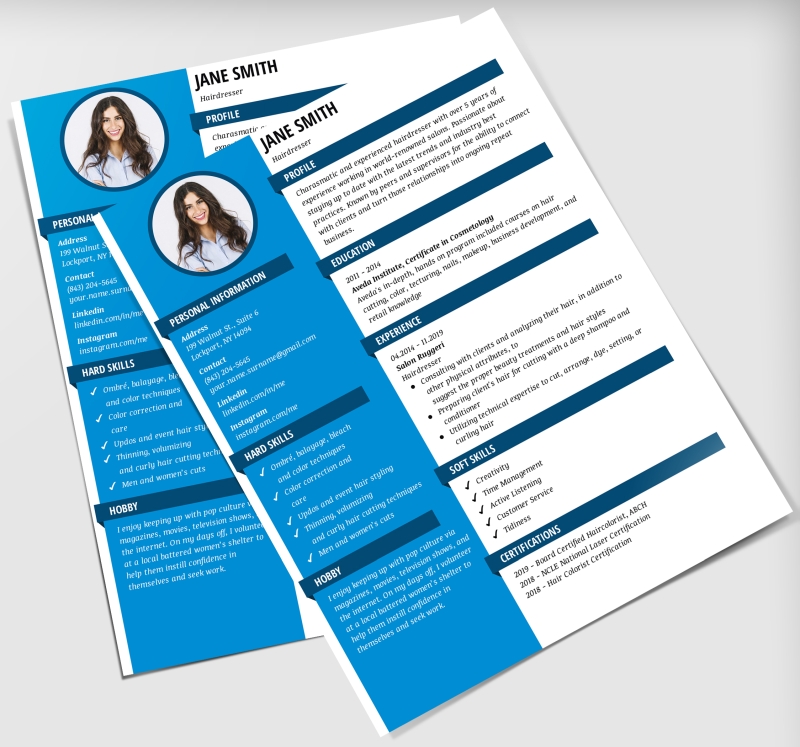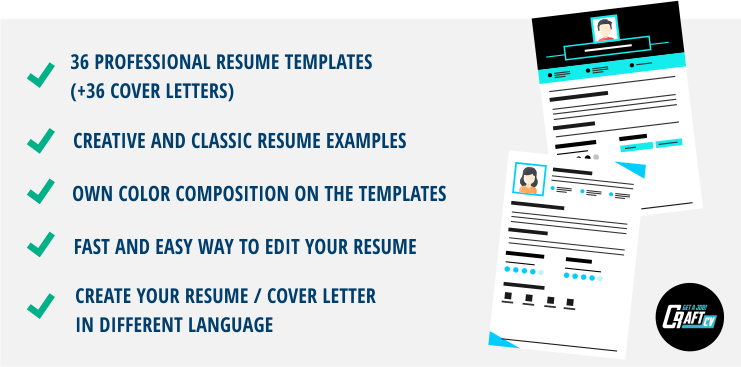Relevant Coursework In A Resume - Where and how to display coursework in a resume? How to choose coursework that would be relevant to an employer?
Coursework and training are an opportunity to improve our qualifications and develop skills that are useful at our job. There’s a huge amount of seminars and workshops you can choose from. Taking part in them makes one more attractive as an employee.
How to describe the courses you took part in to show you’re better than every other candidate?
This article was created to tell you:
- Where and how to display coursework in a resume
- How to choose coursework that would be relevant to an employer
COURSEWORK IN A RESUME — WHAT KIND IS RELEVANT?
One may think "since training increases my value as a potential employee, it’s good to mention all the courses I’ve been to".Well, it isn’t. If you don’t have a lot of them, sure, write them all down. But if your list is long, it’s not worth it.
Don’t have enough patience or don’t know how to take care of the visuals? We can help! In CraftCV, you can choose a sample from many templates (each with several color schemes). You fill in your personal information and you’re done! Save it in a PDF format and it’s ready to send!
HOW TO DECIDE WHICH COURSEWORK TO INCLUDE IN A RESUME?
- important for your job position
If you apply for the position of, for example, a copywriter, it’s better if you mention one more writing course rather than art course.- organized by a well-known company or person
If you’re picking a few courses you want to write down from many others, pay attention to who organized them. It’s hard to measure how valuable a course ran by a small firm was. There is no doubt like that with a well-known organizer.- Which you have proof of going to
A diploma, certificate. Recruiters will probably not ask for it but just the fact that such proof was prepared for the participants speaks volumes about the organizers’ professionalism.- Which show off your best side
Coming back to the copywriter example – obviously, coursework mentioned in their resume should relate to the position – even indirectly! It’s great if you learned to write convincingly, creatively, correctly, or however else, it’s going to matter.
But how about leadership skills? Time management? Also useful, incredibly so! If you’ve done this type of coursework, feel free to add it to your resume. You will stand out amongst other candidates because it will show that you care not only about hard skills but also soft ones – which are very desirable on the job market.
Some examples of courses which will look good in a resume:
- time management
- project leadership
- creative writing
- leadership courses
- coping with stress
Additionally:
- foreign language courses
- Excel/Word courses
- marketing knowledge (eg. creating ad campaigns, newsletters)
- navigating Social Media
- film making
- art programs
- training on how to use a cash register
- using CRM
Warning! Remember to only consider up-to-date info. Can you still remember what you learned at that one language course 10 years ago? If not – better not mention it.
If you want to know how to write a convincing career summary, read this article: Resume Objective Examples - How to write + Tips
HOW TO CHOOSE AN INTERESTING COURSE?
One that will fit the position you’re trying to get?
Think:
1. Which abilities are important in my industry (for example, an oriental cook may benefit from Indian cuisine workshops).
2. What do you do – or rather will be doing – at your job? Which other tasks aside from the standard ones will you be taking care of? (ex. a seamstress or fashion designer may benefit from a fashion photography course)
3. What can your career develop into? What other abilities can be useful to you? (eg. Basic knowledge of art software can be of use to a social media manager)
If you’ve taken a niche/ advanced, technical, or unique course, then it would definitely help your resume stand out- so include it when you’re listing relevant coursework on your resume.
We know which coursework to include in a resume. Next question – how much? Consider how much free space you have in the resume (after all the most important information got written down). If you feel like including a few more workshops will make it look fuller (but not too full), go ahead. Remember that those should be the courses which confirm the qualities a recruiter is searching for and fit the requirements placed in the advert.
WHERE AND HOW TO LIST COURSES AND TRAINING IN A RESUME
Coursework is worth having its own, separate section. Samples made by us with CraftCV, which you can easily use, can include up to 5 additional sections and one of them can be coursework/training/certificates.
Your list can also be formatted just how you want it – add bullet points, bold the text, add a link to a portfolio… Whatever makes it better to read.
What information should be included in the description of a course in your resume?
Let me show you on an example:
Training completion date | Organizer | Course name
10. 2020 – English in business (certificate [CERTIFICATE NAME])
If the name is not specific, it’s good to add what the course was about – what skills we have gained.
NOT JUST WORKSHOPS – WHICH FORMS OF GROWTH TO
ALSO INCLUDE IN A RESUME
Some jobs require special qualifications that are certified. Those are also important in a resume.
Those include but are not limited to:- physical recreation instructor course with a hatha yoga specialty
- lift truck operator course
- trainer certificate
- barman/waiter course
- babysitter course
If you’ve graduated technical college or vocational school, you can also add qualifications you gained there (with their number and name).
In the coursework and training section, one can also include taking part in conferences. If their name doesn’t tell much, you can mention what it was about or what topics were discussed.
I encourage you to take part in courses. Constantly raising your qualifications is an excellent way to take your career to the next level. Remember that lots of courses can be attended without leaving the house – with the use of the internet!
PS. If you're applying for jobs in Europe, remember to add an up-to-date clause for recruitment purposes. GDPR is enforced in the entire European Union, which is why the clause is a necessary formality. You don't have to put it on display (unlike your experience and skills). It's important to just remember about it and include it at least in fine print at the bottom.

Magdalena Światłowska
Co-owner of CraftCv. Graduated in Computer Graphics. She is the author of all the CV templates and visual identification of the service. She believes in fair e-marketing therefore she loves to test, analyze, and learn new solutions and marketing strategies. Mindful budgeting, organization and planning are Magdalena's main traits.
In her free time you can find her on the gym or playing strategy games like StarCraft II. She likes to watch netflix and is definitely a cat person





